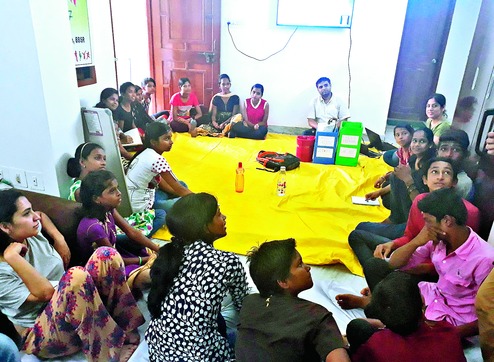
Bhubaneswar, Aug. 1: The civic body today organised a special workshop with the help of Bhubaneswar Urban Knowledge Centre to create awareness on importance of segregation of waste at source.
The centre is a wing of the Bhubaneswar Development Authority meant for capacity building of the officials. It is a common platform among the major city authorities, and it mainly looks after capacity building of the planners.
Today's workshop witnessed participation of more than 30 child leaders from various pockets of the city.
As part of the citizen connect initiative under Bhubaneswar City Lab, the children were briefed on various initiatives and projects undertaken by the city to make streets, parks and public places child friendly and accessible to all.
The Bhubaneswar City Lab is created in the lines of the Smart City Lab. It takes community participation in city planning to the doorstep of citizens. It believes in collaborative partnerships between citizens and experts as that is the ideal way to come up with innovative solutions to make the city smarter.
Apart from learning about the positive impact of waste segregation at source, the children were explained in details about various types of waste as well as the citizens' responsibility towards ensuring a green environment by managing the waste.
At present, the city generates around 500 metric tonnes of municipal solid waste a day.
"The children are the future of this country. They are the ones, who will take sensible approach for the welfare plans we have implemented in the city. Waste segregation at source is an important initiative under Swachh Bharat, and we are committed to achieve it," said mayor Ananta Narayan Jena.
The participating children today also shared their ideas on what they think they can do for effective segregation of waste while putting their best for reduction and reuse of materials.
"We need to keep a close eye on those violating the norms and make them realise about their fault," said Akash Das, a school student who took part in today's event.
The children were also suggested ways to reduce and reuse of materials, such as using both sides of paper, refill pens instead of use-and-throw ones, carrying water bottles while going out and so on. "We need to segregate the waste and also take efforts to lessen waste generation," said Lalit Ojha, another participant here.
A senior official of the Bhubaneswar Municipal Corporation said they had installed coloured bins across the city to ensure source segregation of waste.
"We have doubled the number of bins from 4,000 to 8,000. However, due to lack of awareness, not many people are using the bins properly. We need to sensitise them on the segregation," said the official.
Nayapalli resident Bidyadhar Mishra said it was true that the civic body had provided dustbins, but failed to make use of it. "General public are not aware about biodegradable or non-biodegradable waste. They need to be taught locally about the difference of the waste and asked to use the dustbins accordingly," said Mishra.











